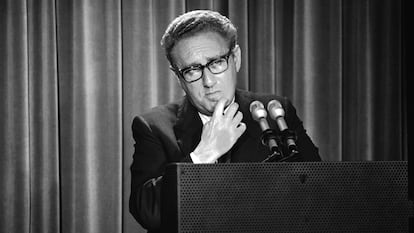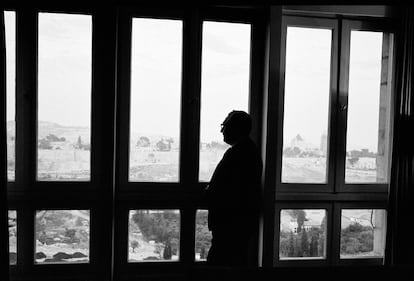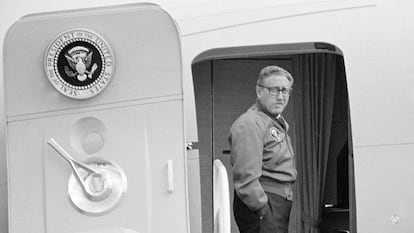Henry Kissinger, who shaped US foreign policy in the second half of the 20th century, dies at 100
The controversial winner of the 1973 Nobel Peace Prize winner passed away at his residence in Connecticut


Henry Kissinger, the strategist who set the course of U.S. diplomacy in the second half of the 20th century, died on Wednesday at his residence in Connecticut, his consulting firm announced. He was 100. A former secretary of state under two presidents — Richard Nixon and Gerald Ford — and controversial winner of the Nobel Peace Prize, Kissinger played a key role in the restoration of relations between the U.S. and China. He was criticized for his policies in South East Asia and in Latin America, including his responsibility in bombing Vietnam and his support for Augusto Pinochet’s coup in Chile.
One of the most controversial figures of the last century, Kissinger was unmistakable with his characteristic horn-rimmed glasses and a German accent that he never lost. He remained active until the very end: this year, he was still promoting his book on leadership styles, had testified before a Senate committee on the North Korean nuclear threat, and made a surprise trip to China for a meeting with President Xi Jinping.

Born in Germany in 1923 — his name at birth was Heinz Alfred Kissinger — to a Jewish family, he arrived in the United States as a teenager, in 1938, fleeing the Nazi regime. During World War II he enlisted in the U.S. Army and was stationed in Europe. Kissinger was as intellectually brilliant as he was arrogant, had a keen sense of humor, and was interested in numerous disciplines; in fact, he nearly turned to scientific studies before settling on international relations. After a distinguished 17-year academic career at Harvard University, he entered the U.S. Administration under the Republican president Richard Nixon, who appointed him National Security Advisor and later Secretary of State.
In the 1970s, he played a key role in most of the world events of the Cold War, and his imprint still lingers half a century later. He was all about realpolitik and pragmatism. His style of diplomacy sought to achieve practical goals, rather than principles or the desire to export political ideals. For his defenders, he succeeded in promoting U.S. interests and expanding his country’s influence in the rest of the world, leaving it in a position that would eventually enable it to win the Cold War and remain the world’s only superpower. For his numerous detractors, he was a cross between Machiavelli and Mephisto who was never held accountable for actions that left a huge trail of damage and suffering in affected countries.
He spearheaded arms control talks with the Soviet Union that opened a way to modulate tensions between the two superpowers. He led the negotiations for the Paris peace accords with North Vietnam that opened a way out for the United States from an unpopular, costly and seemingly endless war. Two years after the signing of the pacts, Saigon fell into the hands of the communist regime, while the last diplomats and refugees fled by helicopter from the roof of the American Embassy.
With a diplomacy of constant travel to the Middle East, he expanded ties between Israel and its Arab neighbors. A 32-day marathon of meetings and pressure on the ground succeeded in separating the Jewish State and Syria on the Golan Heights; a similar attempt in 1975, however, failed to achieve an agreement between Israel and Egypt. He was one of the great architects of the rapprochement with China: his two trips to the Asian giant, one of them secretly to meet with the prime minister, Zhou Enlai, opened the door to Nixon’s historic visit to Beijing in 1973, which led to what until then had seemed unthinkable: the normalization of relations between the United States and the Asian country, then under communist rule, after decades of enmity.
His fear of leftist regimes in Latin America led him to support, when not outright promote, military dictatorships in the region. In 1970 he conspired with the CIA to destabilize and bring about the fall of the democratically elected government of Salvador Allende in Chile.

If fame never left him, neither did controversy. His policies in Southeast Asia and his support for dictatorships in Latin America led to accusations of being a war criminal and demands that he be held accountable for his decisions. His 1973 Nobel Peace Prize, awarded ex aequo with North Vietnam’s Le Duc Tho — who turned it down — was one of the most controversial in history. Two members of the Nobel Committee responsible for awarding the prize resigned. Criticism and demands for an investigation into the secret U.S. bombing of Cambodia in 1970 rained down. That operation was aimed at destroying supply lines from North Vietnam to support communist guerrillas in the south. But its critics believe it precipitated the Khmer Rouge taking control of Cambodia and unleashing an era of terror in that country in which nearly two million people died.
After the September 11, 2001 attacks in the United States, then-president George W. Bush chose him to head an investigative committee. The Democratic opposition denounced a conflict of interest with many of Kissinger’s consulting firm’s clients, forcing the former secretary of state to resign.
Divorced in 1964 from his first wife, Ann Fleischer, with whom he had two children, for a decade he earned a reputation as a womanizer despite his unassuming physique — “power is the best aphrodisiac,” he claimed. In 1974 he married Nancy Maginess, an aide to New York Governor Nelson Rockefeller.
Numerous times he was asked if he regretted any of the measures he had taken or supported. In an interview with ABC television in July 2022, he replied that “I have developed no great answer for it. Because I’ve been thinking about these problems all my life. It’s my hobby ... it’s my occupation. The recommendations I made were the best I was then capable of.”
Sign up for our weekly newsletter to get more English-language news coverage from EL PAÍS USA Edition
Tu suscripción se está usando en otro dispositivo
¿Quieres añadir otro usuario a tu suscripción?
Si continúas leyendo en este dispositivo, no se podrá leer en el otro.
FlechaTu suscripción se está usando en otro dispositivo y solo puedes acceder a EL PAÍS desde un dispositivo a la vez.
Si quieres compartir tu cuenta, cambia tu suscripción a la modalidad Premium, así podrás añadir otro usuario. Cada uno accederá con su propia cuenta de email, lo que os permitirá personalizar vuestra experiencia en EL PAÍS.
¿Tienes una suscripción de empresa? Accede aquí para contratar más cuentas.
En el caso de no saber quién está usando tu cuenta, te recomendamos cambiar tu contraseña aquí.
Si decides continuar compartiendo tu cuenta, este mensaje se mostrará en tu dispositivo y en el de la otra persona que está usando tu cuenta de forma indefinida, afectando a tu experiencia de lectura. Puedes consultar aquí los términos y condiciones de la suscripción digital.








































